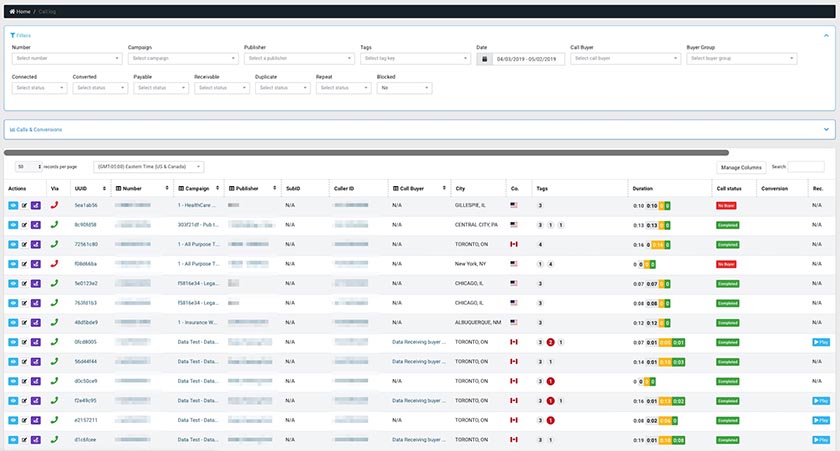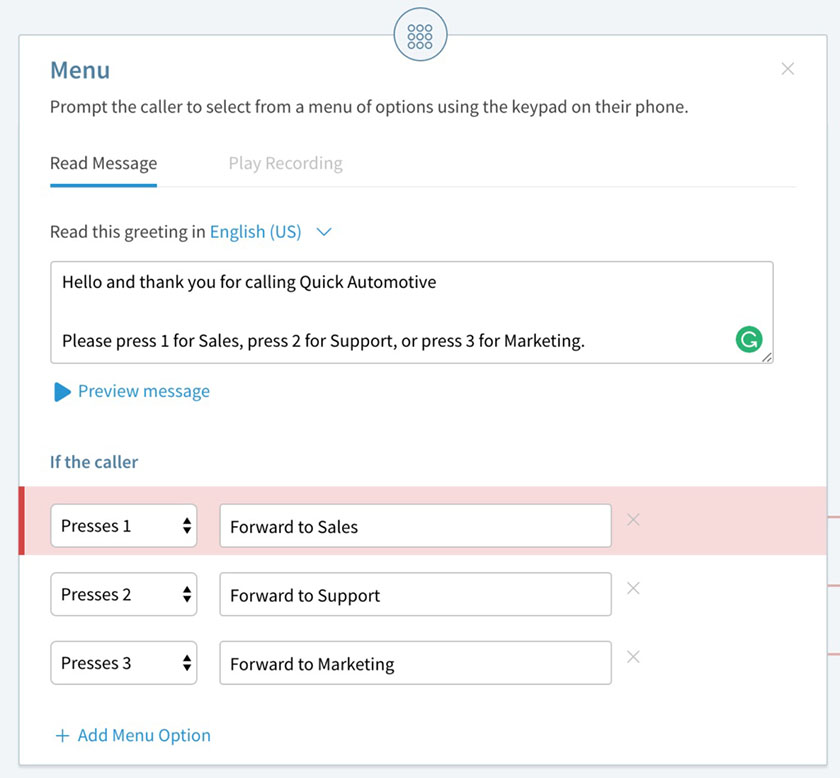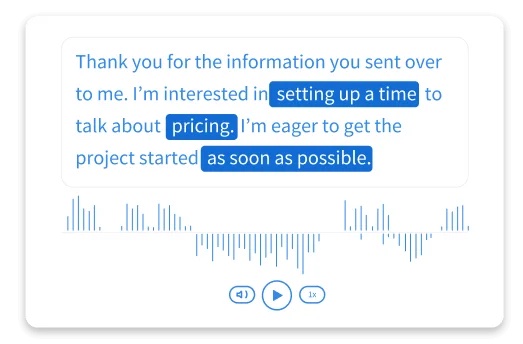Call tracking is the process of assigning unique phone numbers to ad campaigns to determine which marketing tactics are driving the phone calls. Aside from helping businesses measure the effectiveness of strategies, call tracking software offers robust customer data, including their location and demographics. Here, we answer the questions “What is call tracking?” and “How does call tracking work?” to guide your call tracking efforts.
Call Tracking Explained
According to the call tracking definition, this performance marketing technique primarily uses call attribution, tying phone numbers to specific ad sources. Traditionally, marketers manually implement call tracking, asking callers how they found out about the company. Now, with technological advancements, teams use business call tracking software to automate this process.
What is call tracking software exactly? This computer program features a dashboard that shows the tracking numbers assigned for each marketing channel. It has a built-in reporting tool, helping you understand which campaigns effectively make the phones ring. As the software records critical call information, you won’t have to ask every customer how they learned about your business.

Retreaver, a call tracking solution, features a call log dashboard that displays the tracking numbers customers called. (Source: Retreaver)
Retreaver’s call log dashboard provides an overview of all customer conversations. Each call record has important tracking information, including the phone numbers called, the campaign, and the duration of the call. The caller’s location is likewise displayed for each call log. All this information offers meaningful insights into improving communication strategies applied in marketing and customer service.
How Does Call Tracking Work?
The process of call tracking hinges on tracking numbers, which can be static or dynamic phone numbers. A static phone number is a phone number hardcoded on your website, which doesn’t change under any circumstances. In contrast, a dynamic number is a phone number on the website that changes depending on how a user landed on your website.
A user who found your page through organic search will see a different phone number from someone who landed from a social media ad. The process of substituting phone numbers automatically is called Dynamic Number Insertion (DNI). These unique phone numbers associated with individual marketing campaigns help you distinguish the source of each incoming call.
To understand further how these numbers work in the call tracking process, here’s a rundown of a typical call scenario:
- Business X runs two campaigns simultaneously: Google Ads and radio ads.
- It buys two unique phone numbers from a call tracking provider, one for Google Ads and one for radio ads.
- An interested customer sees the campaign and calls the number.
- The call tracking software receives the incoming calls and captures important information, including the caller’s phone number, date and time of the call, wait time, and ad campaign or channel that drove the call. It also documents the products and services the caller is interested in and if the caller has called for the first time or not. The recording of information is quick and unnoticeable to the caller.
- The call will then be forwarded to Business X’s main phone number, where a customer service representative will accommodate their questions or concerns.
Benefits of Call Tracking
Why use call tracking? Businesses receive multiple calls daily, with some unaware of how callers knew about their products and services. It’s a huge missed opportunity to gather helpful insights that inform future marketing strategies. With a call tracking system, it’s easy to attribute inbound calls to specific initiatives and improve lead generation and conversion efforts.
Based on the call tracking definition, its primary purpose is to offer detailed ad campaign insights. It’s easy to determine if a specific initiative is worth continuing and if you’re getting the most out of your marketing spending. Aside from tracking ROI, call tracking helps boost returns. Since you know where high-quality leads are coming from, you can strategize better where to invest and expect increased conversions.
ROI reporting helps businesses know which ad initiatives are performing well. (Source: CallTrackingMetrics)
The call tracking software CallTrackingMetrics features ROI reports, which outline the financial performance of each advertising campaign along with agent performance. The template enables you to label each call as converted or not and add the corresponding dollar amount. With this, it’s easy to track ROI and measure the effectiveness of campaigns.
Call tracking solutions offer a timeline of every interaction the caller had with your marketing efforts. This analytics feature shows you the customer’s website touchpoints before, during, and after calling your business.
This valuable information gives meaningful insights into what drives (or delays) conversions. On top of this, some solutions integrate with customer relationship management (CRM) systems, helping you build more accurate customer profiles that inform marketing strategies.
Like typical business phone systems, call tracking software is equipped with interactive voice response (IVR) and automatic call distribution (ACD), routing callers to the right agents who will accommodate their needs best. Since call tracking solutions capture important customer data, such as call intent and the caller’s geographical location, you’ll be able to develop a more engaging communication strategy for a specific group of customers.

Create custom IVRs on CallRail to direct callers to the appropriate departments within your organization. (Source: CallRail)
Call tracking software CallRail features an IVR system that makes call management more efficient. It enables you to record greetings and menu options for different customer needs. As the caller chooses an option and presses a number on their phone’s keypad, CallRail routes the call to the proper teams and customer service representatives.
Aside from IVR and ACD, call tracking solutions come with call recording capabilities. This allows you to evaluate agent performance and develop training programs that address skill gaps.
Some providers like CallRail feature conversation intelligence, which automatically transcribes calls and highlights sales-related keywords, such as “appointments” or “quote.” This makes it easier for businesses to refer to phone conversations and take note of the next critical steps without playing the entire recording.

CallRail’s call transcription highlights keywords, making it easy for agents to decide what action steps to take. (Source: CallRail)
Disadvantages of Call Tracking
Although call tracking has a lot of benefits, it also comes with a few drawbacks. In a nutshell, the disadvantages come from the use of multiple phone numbers, which puts customer engagement and online presence at risk.
Read on to learn the specific cons of call tracking:
As call tracking for business uses unique phone numbers, customers may be a little reluctant to dial numbers different from your company’s main phone number. One solution that addresses this issue is choosing vanity numbers. Some providers like CallTrackingMetrics offer the option to buy or port custom, memorable numbers, which help make contact numbers familiar and dispel confusion among the target audience.
Consistent information is essential in maintaining excellent search rankings. From the company name and address to your phone number, web crawlers must see the same details across different web pages to establish credibility online.
With DNI, the use of multiple numbers on the website isn’t an issue since the number swapping happens in JavaScript after the page loads. Web crawlers see the same hard-coded number, despite website visitors seeing different numbers based on the marketing channel they came from.
The problem arises when you use tracking numbers on other websites, such as social networks, business directories, and review platforms. Since DNI isn’t an option in these assets, the numbers are hard-coded. These tracking numbers are different from your main phone number, which could have a negative impact on your search rankings. A workaround here is to add multiple phone numbers to the mentioned third-party websites.
Basic call tracking services reuse tracking numbers when a business cancels its subscription. Thus, you may receive calls from people interested in the company that has previously used your number. Or, if you’re the one who canceled the service, your customer may have saved that tracking number and not be able to reach you again.
Pro tip: It’s important to know the policy of call tracking providers on re-offering numbers after cancellation. Check if their grace period is enough for your business to transition smoothly.
Features of Call Tracking Software
Many voice-over-internet-protocol (VoIP) features are in call tracking solutions, including phone number management, call routing, and call reporting and analytics. Other tools include call attribution and call monitoring.
These are some of the features to expect in call tracking software:
- DNI insertion: A code is embedded on your website, enabling the phone numbers displayed to change depending on the marketing channel the visitor came from. These channels include organic search, pay-per-click ads, listing directories, and other online assets where your business has a presence.
- Visitor- and source-level tracking: Trace a customer’s entire journey as they navigate to, from, and around your website. For offline marketing initiatives, use a unique tracking phone number to know the exact source of leads.
- Attribute-based call routing: Connect customers to the right team member or department. Configure the call flow based on specific contact attributes, like geolocation or product interest.
- Custom IVR: Instruct callers on how to reach a specific department or customer service representative with custom menus. Aside from key presses, interactive voice response (IVR) recognizes and responds to voice commands.
- Call recording: Keep records of calls to assess individual and team performances. Call tracking software provider CallTrackingMetrics keeps all recordings until you cancel the account.
- Call monitoring: Listen live to phone conversations between callers and agents. In many platforms, managers have the option to use the whisper feature and coach an agent without the customer hearing. They can also use the barge feature, which lets team leaders join the conversation.
- Call scoring: The call tracking software evaluates the call data based on several predetermined standards and gives it a score. A few metrics include how quickly the call was answered and how faithfully the agents followed the script.
- Reporting: Refer to conversion reports to understand what types of ads and communication channels drove the sale. Some providers like Retreaver have ROI reports that make it easy to track returns contributed by each call source, campaign, tracking number, and handling agent.
Who Uses Call Tracking Software?
Businesses that primarily rely on phone calls to measure lead generation and conversion efforts will find many ways to maximize call tracking. Read on to learn some useful applications of call tracking for small businesses:
Many law offices advertise their services on Google, vying for the top spot on the search engine to earn clicks. The bidding for competitive keywords is costly. Thus, it’s important for law firms to track calls from Google ads and determine the actual ROI. On CallRail, you’ll be able to leave tags to categorize phone calls. Tag conversations according to the particular legal case inquired by the client.
If you promote your properties on popular listing websites, Zillow, Redfin, and MLS, it’s best to set up a call tracking system to evaluate the effectiveness of advertising efforts in these channels. With transcripts of recorded calls, quickly refer to clients who requested an appointment or real estate showing.
Hospitals and clinics rely heavily on phone calls when accepting appointments. With call tracking software, it’s easy to see which among your advertising strategies, display ads, email newsletters, or billboards, are driving patients to call. Call tracking solution WhatConverts complies with Health Insurance Portability and Accountability Act (HIPAA) standards when tracking calls.
Top Providers With Call Tracking Features
The best call tracking software has an extensive set of call attribution, call routing, and call analytics tools. It features robust third-party integrations, complementing organizations’ existing tech stack. The providers below are excellent platforms:
Frequently Asked Questions (FAQs)
Where to find free call tracking numbers?
Popular call tracking platforms like CallRail offer subscriptions that include free tracking numbers. However, you need to pay an extra fee for additional numbers. CallRail charges $3 for local numbers and $5 for toll-free numbers.
Is there free call tracking software?
No, but most of the top call tracking solutions offer a free trial. Moreover, some platforms like Ringba don’t have a monthly subscription fee. Instead, you’ll only pay for the phone numbers and calling minutes you’ll use.
What are call tracking metrics?
Call tracking metrics in different platforms vary, but generally, they show the total number of calls by day and time, calls by landing page, top lead sources, and top caller locations. These help you learn what kind of audience your campaign effectively captures and recalibrate future strategies.
Bottom Line
To effectively optimize advertising efforts, it’s important to gather, monitor, and analyze data. Using call tracking software, you’ll be able to tie callers to specific marketing channels and campaigns and make the necessary adjustments to strategies.
Explore different platforms offering a wide range of call attribution tools. As you launch your marketing campaigns, improve agent performance and customer experience by keeping an eye on these call center metrics and key performance indicators.